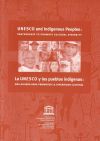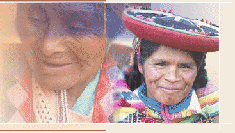“There is just one thing that is very clear for me, and it is that we, Indigenous Peoples, have lost a lot. Nevertheless, we have but a lot to gain in the future. There is no more to be lost. It is there that lies our strength, and the strength of Peoples is what has resisted, produced and saved in most negative times for their culture and their identity.”
Rigoberta Menchú, Nobel Peace Prize. Statement at the Summit of Indigenous Peoples of the Americas. Ottawa, Canada, March 2001.
“Indigenous communities, peoples and nations are those that, linked in a historical continuity with societies prior to the invasion and colonization staged on their territories, consider themselves different from other sectors of the societies that now prevail on those territories or a part thereof. Presently, they constitute non-dominant sectors of society and they are determined to preserve, develop and transmit to future generations their ancestral territories and their ethnic identity as the basis of their continued existence as a peoples, in accordance with their own cultural patterns, their social institutions and their legal systems.”
That is the definition enunciated by the United Nations Special Rapporteur, J. Martínez Cobo, in the “Study of the Problem of Discrimination Against Indigenous Peoples,” finalized in 1984. This report was a landmark in the study of the indigenous issue by the United Nations, that presently counts, among its top-priority objectives, the approval of the Declaration on the Rights of Indigenous Peoples, in the framework of the International Decade of the Indigenous Peoples of the World (1995-2004).
Since 1995, August 9 marks the International Day of Indigenous Peoples, a tribute and a commemoration of indigenous civilization, that demands the exercise of its economic, political, social and cultural rights, present in the national as well as international legal norms, treaties and conventions.
Rights of Indigenous Peoples
The identification and recognition of the rights of Indigenous Peoples has been the result of increasing pressure exerted by indigenous organizations on international organizations, that has produced impressive progress in the last 25 years. However, one must acknowledge that a gap persists between the formal recognition of those rights and their true exercise.
Even the reply to the question ¿who is an indigenous person? has not found an easy solution in the international scene, as has been the case of the achievement of a definition of Indigenous Peoples. The United Nations request indigenous groups to define themselves as such.
It was in 1989 when the term “Peoples” was first spoken of, with the approval of ILO Agreement 169 that, even though it acknowledges that rights correspond to Peoples, as subjects in themselves, this acknowledgement evades the recognition of self-determination.
The present stage is guided by progress made through the approval of the Declaration of Rights of Indigenous Peoples at the level of the United Nations and the draft American Declaration of Indigenous Peoples. Both texts include a complete recognition as Peoples, including the right to free determination.
At a national level, some governments have achieved significant changes in the perception of their problems and aspirations, as well as in the legal frameworks that recognize their rights. Many governments have recognized, in their constitutions, the multi-ethnic and pluri-cultural nature of their national societies.





